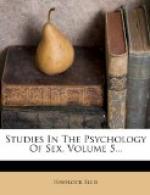In analyzing the sexual impulse I have so far deliberately kept out of view the maternal instinct. This is necessary, for the maternal instinct is specific and distinct; it is directed to an aim which, however intimately associated it may be with that of the sexual impulse proper, can by no means be confounded with it. Yet the emotion of love, as it has finally developed in the world, is not purely of sexual origin; it is partly sexual, but it is also partly parental.[169]
In so far as it is parental it is certainly mainly maternal. There is a drawing by Bronzino in the Louvre of a woman’s head gazing tenderly down at some invisible object; is it her child or her lover? Doubtless her child, yet the expression is equally adequate to the emotion evoked by a lover. If we were here specifically dealing with the emotion of love as a complex whole, and not with the psychology of the sexual impulse, it would certainly be necessary to discuss the maternal instinct and its associated emotions. In any case it seems desirable to touch on the psychic state of pregnancy, for we are here concerned not only with emotions very closely connected with the sexual emotions in the narrower sense, but we here at last approach that state which it is the object of the whole sexual process to achieve.
In civilized life a period of weeks, months, even years, may elapse between the establishment of sexual relations and the occurrence of conception. Under primitive conditions the loss of the virginal condition practically involves the pregnant condition, so that under primitive conditions very little allowance is made for the state, so common among civilized peoples, of the woman who is no longer a virgin, yet not about to become a mother.
There is some interest in noting the signs of loss of virginity chiefly relied upon by ancient authors. In doing this it is convenient to follow mainly the full summary of authorities given by Schurig in his Barthenologia early in the eighteenth century. The ancient custom, known in classic times, of measuring the neck the day after marriage was frequently practiced to ascertain if a girl was or was not a virgin. There were various ways of doing this. One was to measure with a thread the circumference of the bride’s neck before she went to bed on the bridal night. If in the morning the same thread would not go around her neck it was a sure sign that she had lost her virginity during the night; if not, she was still a virgin or had been deflowered at an earlier period. Catullus alluded to this custom, which still exists, or existed until lately, in the south of France. It is perfectly sound, for it rests on the intimate response by congestion of the thyroid gland to sexual excitement. (Parthenologia, p. 283; Bierent, La Puberte, p. 150; Havelock Ellis, Man and Woman, fourth edition, p. 267.)
Some say, Schurig tells us, that the




